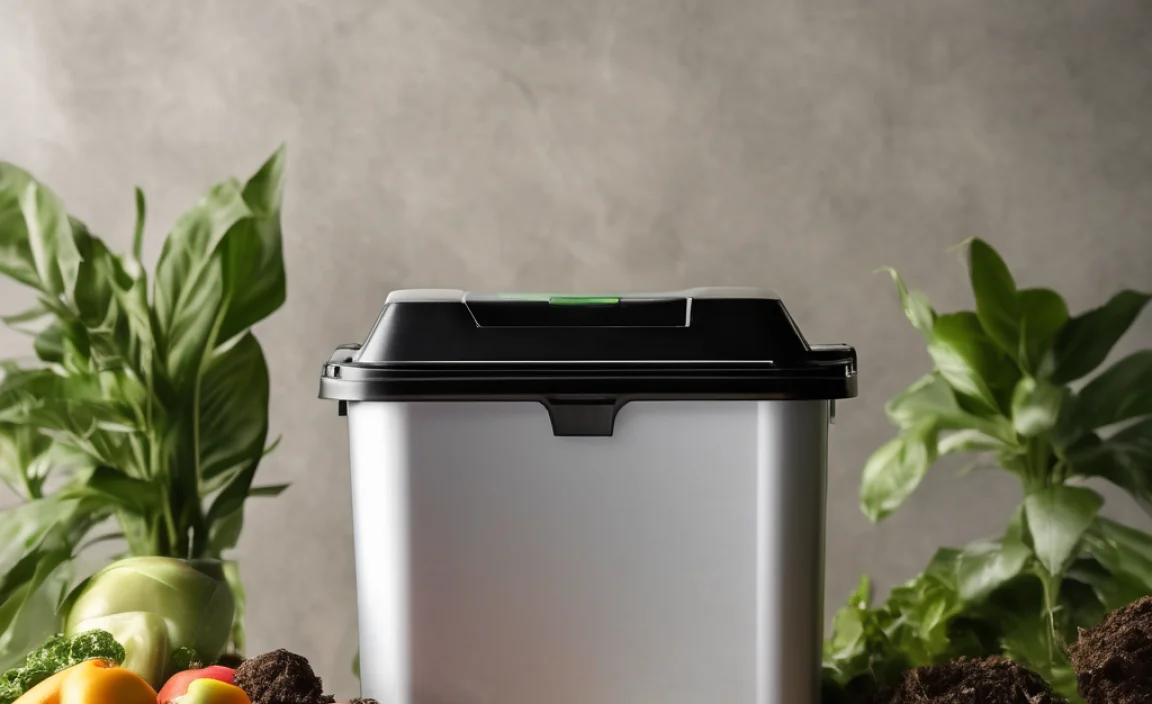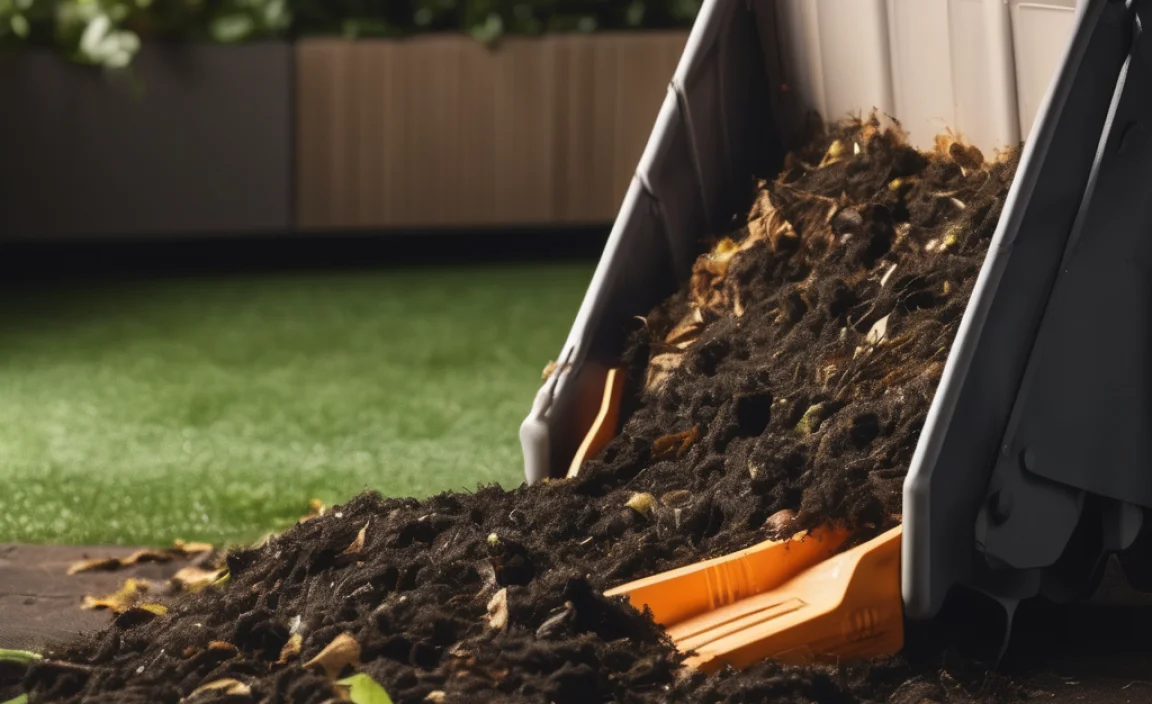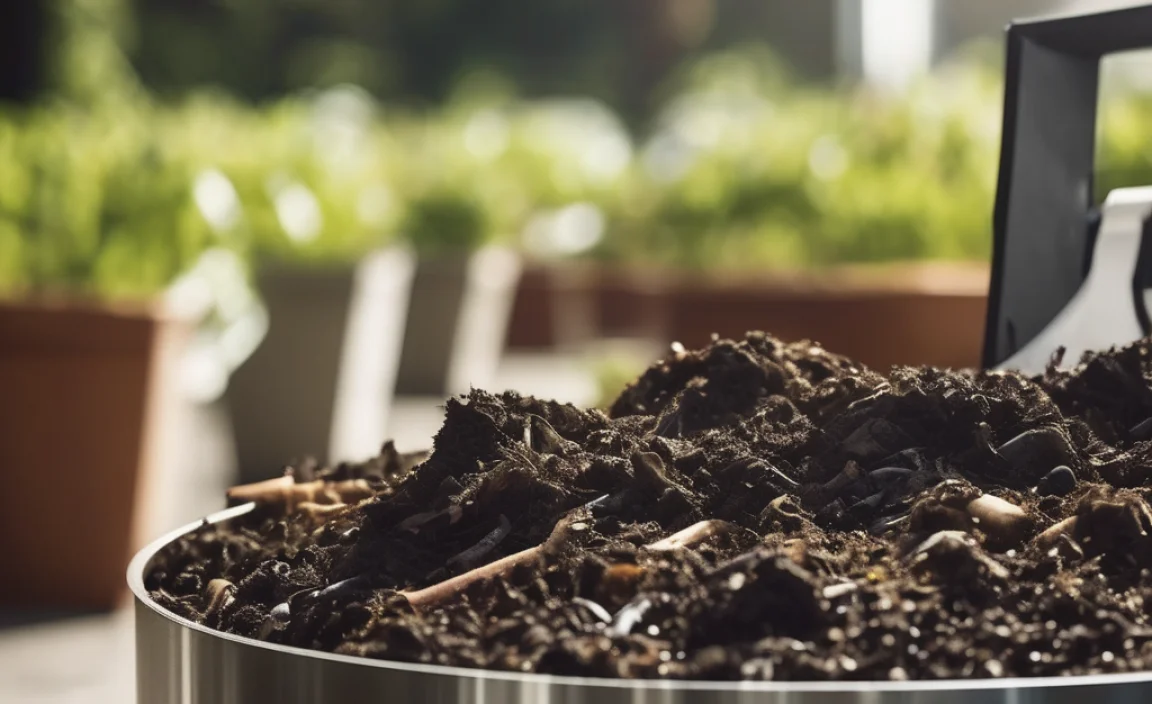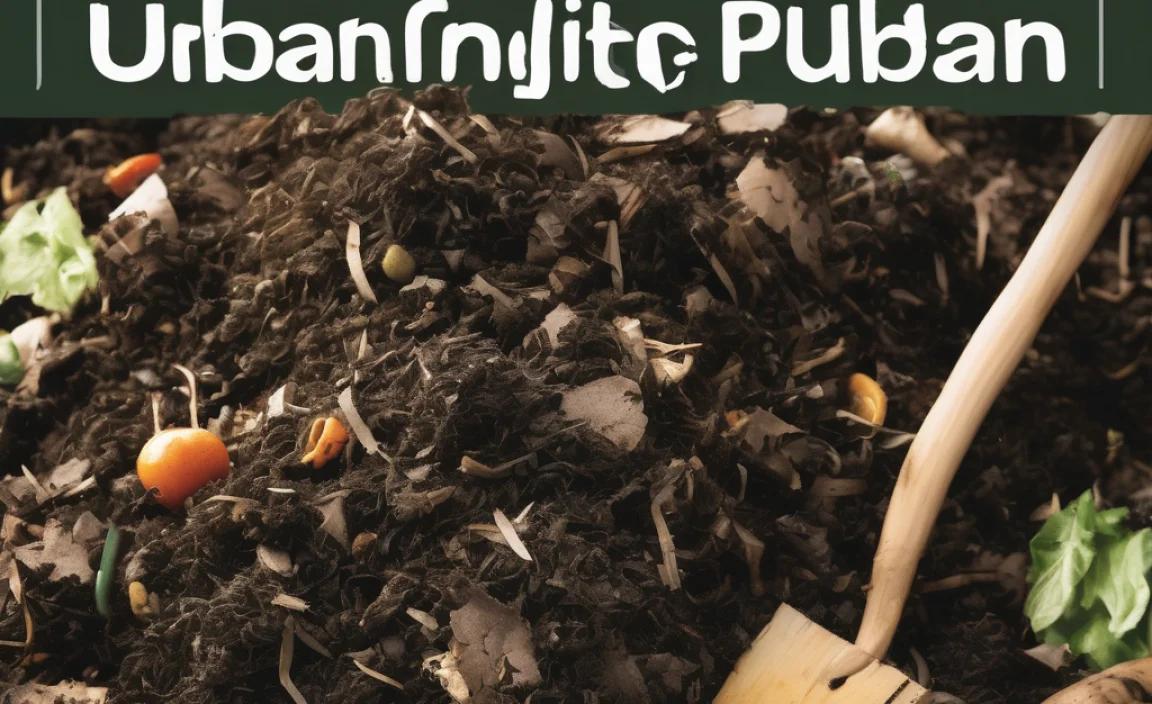Hey there, fellow sustainability enthusiasts! As Troy D Harn from TopChooser, I know that in the fast-paced world of hospitality, every minute counts. You might be thinking, “Composting at a hotel? That sounds like a lot of extra work!” But what if I told you it can actually SAVE you time and money while making your hotel a greener, more attractive place to stay? It’s totally doable! We’re going to break down how to make composting for hotels a breeze, even with a busy schedule. Get ready for some practical, time-saving strategies that’ll make your eco-friendly journey smooth sailing!
Composting for Hotels: Essential Time-Saving Tips to Reduce Waste & Boost Efficiency
Making your hotel more sustainable doesn’t have to be a massive time drain. In fact, implementing a smart composting system can streamline waste management and even improve your bottom line. As Troy D Harn, I’ve seen firsthand how simple adjustments can lead to big wins. Let’s get this done, the easy way!
Why Composting is a Game-Changer for Hotels

Hotels generate a lot of waste – from kitchen scraps and food prep leftovers to floral arrangements and even guest room disposables (the compostable kind, of course!). Sending all this to the landfill costs money and misses a huge opportunity. Composting turns this waste into a valuable resource: nutrient-rich soil that can be used for landscaping, gardens, or even donated. Beyond the environmental benefits, a well-run composting program can:
- Significantly reduce landfill disposal fees.
- Enhance your hotel’s brand image and attract eco-conscious travelers.
- Provide opportunities for local community engagement.
- Create a healthier, more pleasant environment by reducing odors from general waste.
The key to success, especially when time is precious, is to keep it simple and efficient. We’re going to focus on strategies that fit seamlessly into existing hotel operations.
Understanding the Basics: What Can Be Composted?
Before we dive into time-saving, let’s quickly cover what typically goes into a hotel’s compost bin. Think of it as the “greens” and “browns” that make for happy microorganisms.
“Greens” (Nitrogen-Rich Materials):
- Fruit and vegetable scraps (from kitchen prep and dining areas)
- Coffee grounds and tea bags (most are compostable!)
- Eggshells
- Clean food-soiled paper products (napkins, some paper towels – check local guidelines)
- Fresh grass clippings and plant trimmings
“Browns” (Carbon-Rich Materials):
- Cardboard (uncoated, ripped into small pieces)
- Paper products (newspaper, paper packaging – again, check for coatings)
- Dry leaves
- Wood chips or sawdust (from maintenance)
- Straw
It’s crucial to avoid certain items, as they can hinder the composting process or attract pests:
- Meat, dairy, and oily foods (these can create odors and attract pests).
- Diseased plants.
- Pet waste.
- Chemically treated wood or paper.
- Non-compostable plastics and wrappers.
Always check with your local composting facility or waste management service for specific guidelines, as they can vary.
Time-Saving Tip #1: Streamline Bin Placement & Collection

The biggest time-saver is making composting as easy as throwing something in the regular trash. This starts with where you place your compost bins and how you collect the material.
Strategic Bin Placement: Think Convenience
Place compost bins right next to existing trash cans in:
- Kitchens and Food Prep Areas: This is where most compostable material is generated. Make it the default option.
- Restaurants and Dining Rooms: Offer bins at self-serve stations and near plate disposal areas.
- Coffee Shops and Bars: Coffee grounds and food scraps are common here.
- Banquet and Event Spaces: Especially important for buffets and catered meals.
- Housekeeping Carts: Consider small, designated bins for compostable items found in rooms (like tea bags in hospitality trays) or for disposing of guest disposables.
Streamlined Collection Routes
Integrate compost collection into your existing waste management schedule:
- Designated Collection Times: Have staff empty compost bins at the same time they empty trash bins, or immediately after.
- Centralized Collection Point: Designate a specific, easily accessible area for larger compost collection bins. This could be a service alley or a dedicated outdoor space.
- Color-Coded Bins: Use distinct colors for trash, recycling, and compost bins to avoid confusion and speed up sorting for staff and guests. A common standard is green for compost.
Pro Tip: Train your staff on what goes in each bin. A quick, clear training session at the start of the program will prevent contamination and save time on sorting later.
Time-Saving Tip #2: Choose the Right Composting Method for Your Hotel Size

Not all composting systems are created equal. The best method for your hotel depends on your size, available space, and how much compostable waste you produce. Opting for a system that fits your needs perfectly avoids unnecessary complexity and workload.
On-Site vs. Off-Site Composting
This is the first big decision. For most hotels, especially those starting out or with limited space, partnering with an off-site commercial composting facility is the most time-efficient option.
Off-Site Composting Services:
Pros:
- Minimal Time Investment: Your staff simply sorts waste into designated bins. A commercial service handles the rest.
- Scalability: Easily handles fluctuations in waste volume.
- Expertise: Professional composting facilities manage the process efficiently.
- Odor & Pest Control: Managed off-site, reducing on-premises issues.
Cons:
- Ongoing Cost: Requires a contract and regular service fees.
- Less Direct Control: You rely on the service provider.
To find a local service, search online for “commercial composting services near me” or inquire with your current waste management provider – many now offer composting as an add-on. Organizations like the US Environmental Protection Agency (EPA) offer resources on the benefits of commercial composting.
On-Site Composting (Considerations for Larger Hotels or Those with Green Spaces):
This approach offers more control and the potential to use the compost directly but requires more management.
- Tumbler Composter: These rotating bins are excellent for small to medium volumes and can speed up decomposition. They are relatively contained and easy to manage.
- Aerated Static Pile (ASP): For larger volumes, this method uses a system of pipes to blow air through the compost pile, speeding up decomposition and controlling odors. It requires more space and initial setup.
- In-Vessel Composting: Systems housed in bins or containers. They are efficient and can handle various waste streams.
If considering on-site, start small and scale up. A good partner could be a local Master Gardener program or a university extension office that can offer guidance on best practices.
Time-Saving Approach: If going on-site, invest in systems that require less turning or manual labor. Tumblers or well-managed ASP systems are more efficient than traditional open piles.
Time-Saving Tip #3: Simplify Sorting and Training

Confusion leads to errors, and errors lead to wasted staff time correcting them. Clear, simple processes for sorting and effective, repetitive training are crucial.
Clear Signage is King
Post clear, visual signs above every bin. Use pictures of what can and cannot be composted.
For example:
- Compost Bin: Picture of fruit peels, coffee grounds, napkins.
- Trash Bin: Picture of plastic wrap, meat scraps, non-compostable items.
- Recycling Bin: Picture of bottles, cans, clean paper.
Keep it simple. Too much text will be ignored. Hotels like Marriott International have emphasized clear guest communication for their sustainability initiatives, including waste sorting.
Staff Training: Make it Ongoing and Easy
Initial training is important, but reinforcing the message is key.
- Pre-Shift Briefings: Take 2 minutes at the start of a shift to remind staff about composting.
- Visual Aids: Post cheat sheets in break rooms and operational areas.
- “Compost Champions”: Designate a few staff members in each department to be knowledgeable and encourage proper sorting.
- Incorporate into Onboarding: Make composting education a standard part of new employee training.
Time-Saving Strategy: Focus on the “big wins” for sorting. Train staff to primarily look for obvious compostables in the kitchen and dining areas. For guest-facing bins, clear signage is the main time-saver, reducing guest confusion and staff intervention.
Time-Saving Tip #4: Optimize Kitchen Workflow

The heart of a hotel’s waste generation is often the kitchen. Integrating composting here needs to be seamless so it doesn’t disrupt fast-paced meal prep and service.
Designated Compost Stations
Set up specific collection points within the kitchen workflow:
- Prep Stations: Small, easily accessible compost bins at each cutting board or prep area for fruit/veg scraps.
- Dishwashing Area: A larger bin to scrape plates before washing.
- Pantry/Bakery: For coffee grounds, tea, small food scraps.
Smart Bin Liners
Use compostable liners for your bins. This makes emptying quick and easy – just tie up the liner and go. Ensure the liners are certified compostable by a reputable organization like the Biodegradable Products Institute (BPI) if you are sending your compost off-site to an industrial facility.
Pre-Consumer vs. Post-Consumer Waste
Focus heavily on “pre-consumer” waste (scraps from food preparation) as it’s generally cleaner and easier to compost. Educate staff on properly separating these.
- Pre-consumer: Vegetable peelings, meat trim, coffee grounds, eggshells.
- Post-consumer: Food left on guests’ plates. This can be trickier to collect due to varied food types and potential contaminants.
Time-Saving Hack: Train kitchen staff to quickly sweep scraps directly from the cutting board into a nearby compost bin. Reduce the number of steps involved in waste disposal.
Time-Saving Tip #5: Leverage Technology and Partnerships
Sometimes, the best way to save time is to let technology and external partners do the heavy lifting.
Waste Audits and Tracking
While a full waste audit takes time, periodically assessing your waste streams can reveal opportunities for improvement. Some commercial composting services can provide waste diversion reports, which are invaluable for tracking progress and identifying problem areas without you needing to do the auditing yourself.
Partner with Local Farms or Gardens
If you’re doing on-site composting and producing usable compost, local farms, community gardens, or even your own hotel’s landscaping team can be prime recipients. This partnership saves you the time and resources of managing the finished compost and builds community goodwill. Organizations like USDA’s National Agricultural Library highlight the value of local food systems and resource management.
Automated Systems (For Large Scale)
For very large hotels or resorts, consider investing in automated composting systems that reduce the need for manual turning and aeration. These systems typically have higher upfront costs but can significantly reduce labor over time. Consult with specialized composting equipment vendors.
Time-Saver: Use the data provided by your waste hauler or composting service. This gives you insights without requiring manual data collection.
What NOT to Compost: A Quick Reference Table
To speed up decision-making for your staff and guests, here’s a handy table of common items to keep out of the compost bin.
| Avoid (Trash/General Waste) | Why? |
|---|---|
| Meat, poultry, fish scraps | Attract pests, create odors, can contain pathogens. |
| Dairy products (cheese, yogurt, milk) | Attract pests, create odors. |
| Oils, grease, fatty foods | Can coat other materials, slowing decomposition; attract pests; create odors. |
| Diseased plants or weeds gone to seed | Can spread disease or unwanted plants when compost is used. |
| Pet waste (dog, cat feces) | Contains pathogens that may not be killed by home composting temperatures. |
| Non-compostable plastics and wrappers | Do not break down, contaminate compost. |
| Chemically treated wood or paper products | Chemicals can leach into the compost. |
| Glossy or coated paper/cardboard | Coating prevents decomposition and can be plastic-based. |
Conclusion: Your Hotel’s Sustainable Future, Simplified
Composting for hotels doesn’t need to be complicated or time-consuming. By strategically placing bins, choosing the right composting method, simplifying training, and optimizing kitchen workflows, you can implement a program that benefits your hotel, your guests, and the planet. Remember, the goal is progress, not perfection. Start with these time-saving tips, focus on clear communication, and you’ll be well on your way to a more sustainable and efficient
Frequently Asked Questions (FAQs) about Hotel Composting
1. How much time will setting up a composting system really take?
The initial setup of identifying bin locations, ordering bins, and initial staff training might take a few days to a week, depending on your hotel’s size and decision-making process. However, the ongoing time commitment for staff once implemented can be as little as an extra 5-10 minutes per shift for collection, especially when using efficient methods and off-site services.
2. Will composting create bad smells?
When done correctly, composting should not create foul odors. Bad smells usually indicate an imbalance, such as too many “greens” or not enough air. Using compostable liners, regular collection, and choosing a professional off-site service helps immensely in managing odors effectively.
3. How do we prevent contamination in compost bins?
Clear, visual signage is your best friend! Make sure bins are clearly labeled with pictures of acceptable items. Regular, brief staff training and having “compost champions” can also significantly reduce contamination. When in doubt, it’s often better for a questionable item to go in the trash than to contaminate a whole batch of compost.
4. Can guests be trusted to compost correctly?
Guests generally want to do the right thing! Clear, simple signage in public areas and food service spots is key. For guest rooms, providing small compostable bags with clear instructions for disposing of things like tea bags or used stirrers can be very effective, but this is often a later step after mastering front-of-house areas. Start with high-traffic areas where staff can monitor and gently guide if needed.
5. What if we don’t have space for composting bins?
This is a common challenge. For off-site services, you only need enough space for the collection bins at strategic points and a central collection area. Often, existing janitorial closets or service areas can be adapted. If considering on-site, compact tumbler systems or compact bin systems can fit into smaller footprints. Re-evaluating how space is currently used can often reveal hidden possibilities.
6. How much does hotel composting cost?
Costs vary widely. Off-site services typically charge a fee based on bin size and collection frequency. This fee is often offset by reduced landfill tipping fees, which can make composting cost-neutral or even cost-saving. On-site systems have upfront equipment costs but lower ongoing service fees. A preliminary quote from a local commercial composting service is the best way to get an accurate estimate.
.lwrp.link-whisper-related-posts{
margin-top: 40px;
margin-bottom: 30px;
}
.lwrp .lwrp-title{
}.lwrp .lwrp-description{
}
.lwrp .lwrp-list-container{
}
.lwrp .lwrp-list-multi-container{
display: flex;
}
.lwrp .lwrp-list-double{
width: 48%;
}
.lwrp .lwrp-list-triple{
width: 32%;
}
.lwrp .lwrp-list-row-container{
display: flex;
justify-content: space-between;
}
.lwrp .lwrp-list-row-container .lwrp-list-item{
width: calc(25% – 20px);
}
.lwrp .lwrp-list-item:not(.lwrp-no-posts-message-item){
max-width: 150px;
}
.lwrp .lwrp-list-item img{
max-width: 100%;
height: auto;
object-fit: cover;
aspect-ratio: 1 / 1;
}
.lwrp .lwrp-list-item.lwrp-empty-list-item{
background: initial !important;
}
.lwrp .lwrp-list-item .lwrp-list-link .lwrp-list-link-title-text,
.lwrp .lwrp-list-item .lwrp-list-no-posts-message{
}@media screen and (max-width: 480px) {
.lwrp.link-whisper-related-posts{
}
.lwrp .lwrp-title{
}.lwrp .lwrp-description{
}
.lwrp .lwrp-list-multi-container{
flex-direction: column;
}
.lwrp .lwrp-list-multi-container ul.lwrp-list{
margin-top: 0px;
margin-bottom: 0px;
padding-top: 0px;
padding-bottom: 0px;
}
.lwrp .lwrp-list-double,
.lwrp .lwrp-list-triple{
width: 100%;
}
.lwrp .lwrp-list-row-container{
justify-content: initial;
flex-direction: column;
}
.lwrp .lwrp-list-row-container .lwrp-list-item{
width: 100%;
}
.lwrp .lwrp-list-item:not(.lwrp-no-posts-message-item){
max-width: initial;
}
.lwrp .lwrp-list-item .lwrp-list-link .lwrp-list-link-title-text,
.lwrp .lwrp-list-item .lwrp-list-no-posts-message{
};
}

I am passionate about home engineering. I specialize in designing, installing, and maintaining heating, ventilation, and air conditioning systems. My goal is to help people stay comfortable in their homes all year long.

